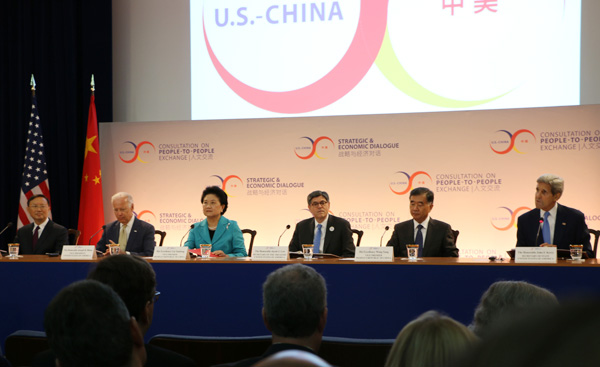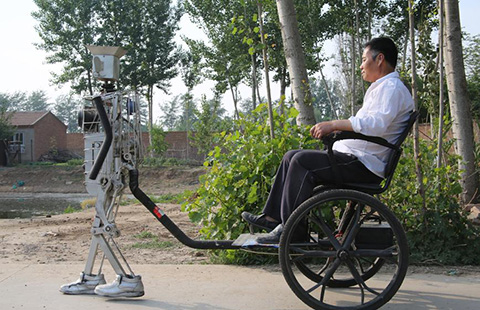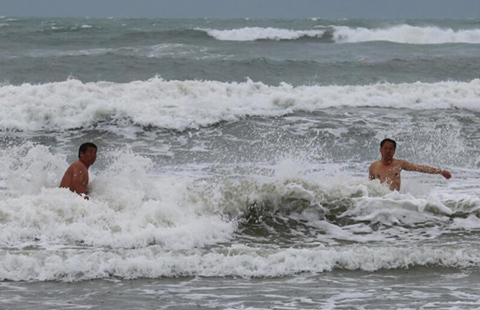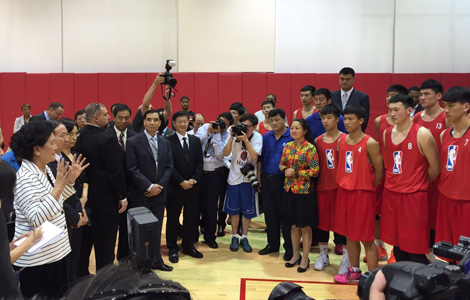Xi pins high hope for S&ED
Updated: 2015-06-23 23:40
By CHEN WEIHUA in Washington(China Daily USA)
|
||||||||
 |
|
From left: Chinese State Councilor Yang Jiechi, US Vice-President Joe Biden, Chinese Vice-Premier Liu Yandong, US Treasury Secretary Jack Lew, Chinese Vice-Premier Wang Yang and US Secretary of State John Kerry attend the opening ceremony on Tuesday morning for the seventh China-US Strategic and Economic Dialogue (S&ED) and the sixth China-US High-Level Consultation on People-to-People Exchange (CPE). CHEN WEIHUA/CHINA DAILY |
While S&ED and CPE have been hailed by both sides as effective mechanisms to expand cooperation and manage differences, they also have been used to pave the way for fruitful visits by the presidents of the two nations. Last November in Beijing, Xi and Obama reached landmark deals on climate change as well as on visa extension and military confidence building.
Ahead of Tuesday's S&ED opening, senior civilian and military officials from the two countries met on Monday for the fifth China-US Strategic Security Dialogue (SSD) to discuss a host of important, sometimes sensitive and controversial issues, exchanging views on strategic security and comprehensive security issues of common concern. The Chinese delegation described the talks as conducted in a "candid, practical and constructive way."
Vice-Premier Liu Yandong has been attending dozens of cultural, educational, sports and public health events since June 19 in Pittsburgh, Houston and Washington, interacting with Americans and demonstrating the power of people-to-people exchanges in the bilateral relationship.
Tao Wenzhao, a senior researcher at the Institute of American Studies of the Chinese Academy of Social Sciences, said that both countries have reduced tensions on the South China Sea issue, which has caught a lot of attention lately. "The South China Sea issue is not the big picture of the China-US relationship. It will benefit both sides if they cool down on South China Sea and instead cooperate on more important issues and explore common interests," Tao said.
Jeffrey Bader, a senior fellow at the Brookings Institute and former special assistant to Obama for national security affairs, also believes the two countries should engage and cooperate with each other more, not less as some have suggested.
In an article posted on Brookings Institution website on Monday, Bader said that the US should not discard the approach taken by eight presidents since President Richard Nixon in favor of an assumption of inevitable hostility and a strategy of across-the-board rivalry that may be compelling in international relations theory but which no president has found persuasive.
"I hope and expect that the ninth president since Nixon, though faced with an evolving China, will not discard the playbook used by the American statesmen who built and nurtured the US-China relationship and built a generation of peace in Asia," he said.
Wang Xu in Beijing contributed to the reporting
chenweihua@chinadailyusa.com

 Ten photos you don't wanna miss - June 23
Ten photos you don't wanna miss - June 23
 The world in photos: June 15-21
The world in photos: June 15-21
 Kris Wu's long legs trigger envy
Kris Wu's long legs trigger envy
 School dropout farmer creates robots
School dropout farmer creates robots
 Typhoon Kujira makes landfall in S China
Typhoon Kujira makes landfall in S China
 Liu visits Houston Museum of Natural Science
Liu visits Houston Museum of Natural Science
 Liu meets Tsinghua Youth team in Houston
Liu meets Tsinghua Youth team in Houston
 Men get into women's shoes for fun
Men get into women's shoes for fun
Most Viewed
Editor's Picks

|

|

|

|

|

|
Today's Top News
Xi points way for Sino-US ties
Xi pins high hope for S&ED
China, US need 'common ground'
Liu challenges university leaders
10 chosen for Eisenhower fellowships
China unveils plans for V-Day parade
China-US talks to explore ways to make Xi's visit a success
Chinese consumers play big part in Apple's designs: Cook
US Weekly

|

|







